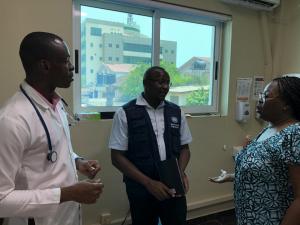Reinforcing emergency response against COVID-19 in Africa
Brazzaville – In an expanded pool of expertise, the World Health Organization (WHO) is supporting several African countries to coordinate the work of external emergency medical teams deployed to support the efforts to contain the spread of COVID-19 pandemic.
Emergency Medical Teams (EMT) are groups of health care professionals such as doctors, nurses, and paramedics that provide direct clinical care in the wake of disasters, outbreaks or other emergencies in support of the local health system. They work in line with classifications and minimum standards set by WHO, and come trained and self-sufficient so as to not burden the national health system of wherever they are working. Member states are the sole decision-maker on whether to accept or reject an EMT.
So far, United Kingdom EMTs have been working in South Africa, Ghana and Zambia. Chinese teams have been working in Ethiopia and Burkina Faso. Despite not being classified as a formal EMT, the teams from Cuba (Cuban Medicale Brigade) is deployed in South Africa and Togo. The EMT from China and the United Kingdom are in the pipeline to six more countries in Africa.
The work of these EMTs is varied: it involves everything from high level coordination meetings with Ministry of Health officials to training front-line health workers and response staff in areas like infection prevention and control, to community engagement and beefing up treatment capacity in areas that have been identified as COVID-19 hotspots.
Lizzie Marmont, a health programmes manager and the EMT focal point for UK-MED, is currently working in Zambia to support the response to COVID-19. She had previously worked in Sierra Leone for two-and-a-half years during the response to the Ebola outbreak there. “I learnt a lot of valuable lessons there,” said Ms Marmont. “Although this is a different disease, a lot of the principles are the same.”
Although many of the principles at the heart of the public health response to COVID-19 and Ebola are the same, such as the importance of engaging and informing local communities and effective screening and contact tracing, COVID-19 presents some unique challenges for responders as a result of international travel restrictions, shortages of key equipment and the novelty of the disease. Nonetheless, she remains optimistic: “It’s been great to work alongside Ministry of Health and WHO colleagues at all levels, from response coordination to health care workers and beyond. Being able to share experiences and ideas has been fantastic.”
Ngonidzashe Nyambawaro, a logistician working alongside Ms Marmont in Zambia, had also been involved in the Ebola response, but in Liberia, and is finding that the global spread of the virus has presented some challenges: “What makes the COVID-19 response in Zambia very different is that is has affected all countries … the competition for resources is overwhelming, to the extent that sometimes you can’t get the much needed support in time.”
Nyambawaro was working to address logistical bottlenecks and supply shortages in Zambia by working alongside Ministry of Health officials and WHO advisors to establish a national supply plan and to map sub-national delivery plans to ensure that scarce medical equipment and supplies were transported to wherever they were most needed and that logisticians could better anticipate future demand.
“I am currently housed in the WHO office and we are collaborating every day with our government counterparts,” said Mr Nyambawaro. “We are responsible for making sure we get information from the provinces and making sure supplies are dispatched on time.”
The challenges of limited resources and international movement restrictions were also affecting the work of EMTs in Ghana. Dr Frederick Mate, a global health specialist with the UK EMT there had initially been deployed for one month, but due to travel restrictions was now in his third month in Ghana.
“Working here involves teamwork,” said Dr Mate. “Whether [you are] in the WHO Office or in the Ministry of Health.” The positive impact of the EMTs was quick to appear, but promises to be long-lasting. “Currently we are developing guidelines and training staff, and there will be continued use of these even when it is time for me to leave Ghana,” he said.
Since COVID-19 is a new virus, health care workers around the world are having to learn on the job how best to handle it. Africa is no exception. “Equally, there is a challenge on trained human resources on COVID-19,” he continued. But despite the challenges, Dr Mate remains optimistic: “These can be overcome by exploring local capacities to manufacture standardized PPE and by training more staff members on COVID-19.”
